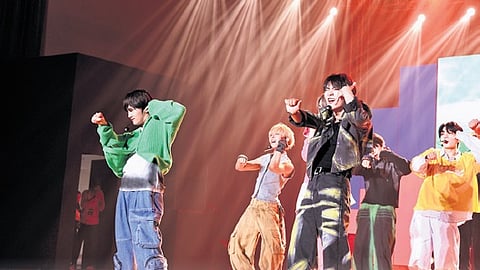

In 2012, when most of the millennials and Gen-Z were in school, no one could have predicted the ripple effect that Korean star PSY’s viral ‘Gangnam Style’ would create. Watching classmates mimic the ‘horse-riding’ dance step became many young Indians’ first brush with Korean culture. Cut to a decade later, India is swept by Hallayu — a Chinese term for the Korean Wave.
Korean language learning has surged by 75 percent year-on-year in the country as per language-learning platform, Duolingo. K-drama and K-pop sensations like BTS, WayV, Super Junior, EXO, BLACKPINK, and Itzy, have become a part of subculture for Gen Z.
Spicy Korean ramen brands are now found in prominent Indian street-side markets while the K-beauty industry is projected to grow at a CAGR of 9.4 percent from 2021 to 2026, as per a report by Mordor Intelligence.
TMS got a glimpse of Hallyu at the two-day event, Rang De Korea, organised by the Korean Cultural Centre India. It saw an impressive line-up of performances by the nine-member K-pop dance group NTX, theatre group Uuheeska, martial arts performance group Balkwang, musical group Pax Arari and artiste Ha Minwoo, who recently performed live at the Jawaharlal Nehru Indoor Auditorium.
The cultural extravaganza also displayed Korean lifestyle — crowds checked out K-beauty brands for the famous “glass-skin effect” while others grabbed a comfort bowl of Korean specialities like spicy ramyeon, kimchi fried rice and gimbap. The fashion brigade gathered around the flea stalls while others attended
DIY Korean mask-making and jewellery box designing workshops. The event’s major pullover was the semi-finals of the 14th All-India K-Pop Contest that saw 10,600 Indians taking part in online auditions in their dream to become the next big K-pop stars. TMS finds how and why Korean culture grows over you.
Korea in India
The event started with Balkwang’s amusing action-comedy act using Taekkyeon, a traditional Korean martial art that uses rhythmic dance-like movements. “Taekkyeon was inscribed as a UNESCO Intangible Cultural Heritage of Humanity in 2011. It is a martial art in which great strength is embedded in soft
movements. We are deeply grateful to see how much Indian people love Korean art forms,” says a member from the Balkwang group. Next, Pax Arari’s performance combining piano with traditional Korean instruments like the daegeum, gayageum, and gwenggari, soothed our senses while Ha Minwoo released three of his unreleased songs on stage.
Drama lovers enjoyed a fusion concert by Uuheeska, which presented a modern reinterpretation of Korea’s traditional comedy theatre. In the final act, it was NTX who cut a rug on not just Korean beats but also Indian viral hits like the song ‘Tauba Tauba’ that saw the crowd jumping from their seats in excitement.
NTX was also the judge for the semi-finals of the 14th All-India K-Pop Contest that gives a platform to Indian talent to be the next K-pop stars and travel to Korea upon winning in the finals. Telling us what it takes to be a true artist, a member from NTX tells TMS, “We need to have songs that express our unique style.
Depending on how a song is interpreted and expressed, it can turn into something entirely different, so understanding the song is key. Also, the attitude we bring to each performance is important. If you give 100 percent to your performance and are able to touch even one person in the audience, you are the best artist, even if you’re not famous.”
Rise of Korean culture
The semi-finals saw 27 teams from different parts of India including Girl Crush, We Unite, Sejal Dubey and Crayons Flower Knights, amongst others compete in the contest. Nancy Srivastav from Lucknow-based The Eclipse group which has members aged 15-25 years, shared why her generation is into K-pop. “K-pop culture is very cool. Most of the artists are down to earth.
They help us discover the possibilities of our bodies through creative performing arts. They do not judge anybody and like to relate with their audience, like BTS, and make them feel part of their family. The best part is, none of the K-pop icons come from rich families, they all have struggled. That’s inspiring,” she says, adding that her group performs freestyle, and popping, with a tinge of charisma, which is the “main ingredient” in K-pop performances.
Aakriti Bhandari of Delhi-based Girl Crush group which was the first runner-up in semi-finals, chimed in: “It’s beautiful to see K-pop artists doing everything — they sing, dance, do stunts and perform art. Our group has taken up dancing inspired by BTS, BLACKPINK, and Exo. We have been rigorously practicing for the contest and performing styles like Afro, hip-hop, and K-pop.” She notes that Northeast India has already been exposed to K-pop quite early but mainland India is recently exposed, due to strong India-Korea relations.
For Shivika Gulati, founder of Outkasts, who won the semi-final dance round, their group hopes to make a lasting impact in the K-pop scene. “We think Indian youth love K-pop for its catchy music, amazing visuals, and effortless choreography. The fandom culture is huge and super interactive!” shares Gulati whose group aspires to attend dance classes in Korea, especially at 1 Million Dance Studio, if they win the finals which will be held in November.
NTX notes that the pandemic also played a big role in piquing interest in K-pop music and drama. “During the pandemic, more people started watching Korean dramas like Crash Landing on You, Goblin and Business Proposal. People were also exposed to the hard work of many famous Korean artists.
Together, it brought enjoyment to the leisure time of people in India,” the group shares, adding such pop-culture shows emotionally comforted the viewers who felt lonely, distressed and sad but eventually found love, relatability and motivation that continues till date for their rising popularity.
The finals of the 14th All-India K-Pop Contest will be held on November 23, at the Yashobhoomi Convention Centre, in Dwarka